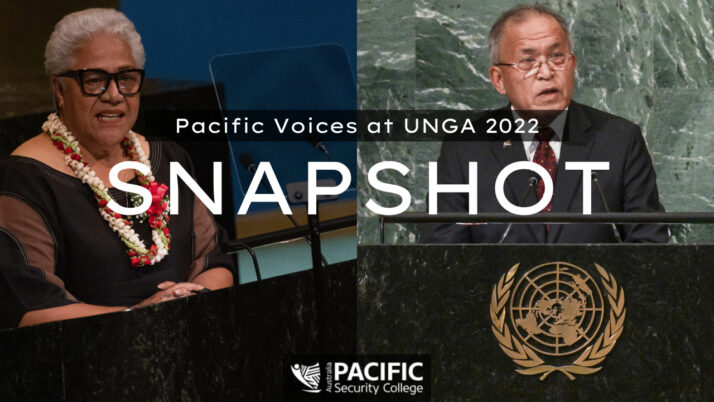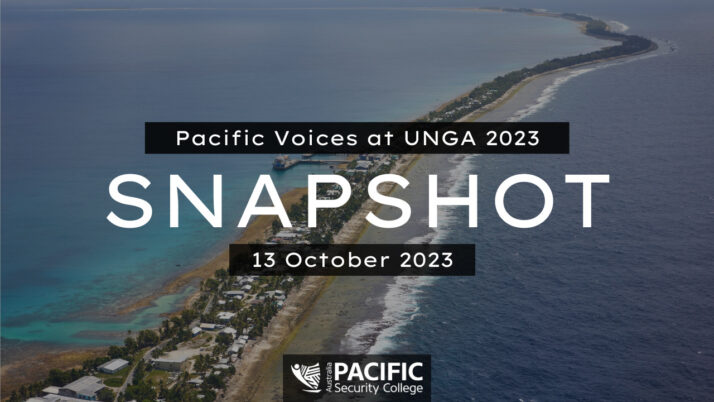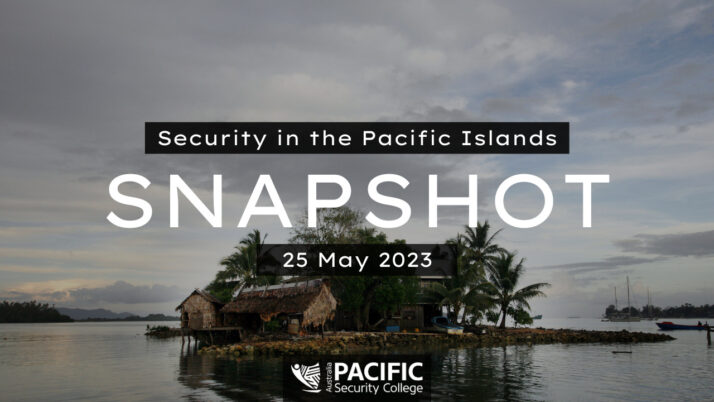Pacific Security Snapshot: Pacific voices at the United Nations

In this special edition of the Pacific Security Snapshot, we look at the key issues raised by Pacific leaders at the recent United Nations General Assembly, including the 2050 Blue Pacific strategy and the need for urgent action on climate change.
“We are here because our future is tied to the entire world; and the entire world needs to hear our message” – Pacific Island Forum Chair, Prime Minister Frank Bainimarama.
The global launch of the 2050 Strategy for the Blue Pacific Continent was the ‘Pacific moment’ of the 77th session of the United Nations General Assembly (UNGA). Pacific voices featured in the general debate and in a special Pacific Islands Forum (PIF) meeting with United Nations Secretary-General António Guterres.
Republic of the Marshall Islands President David Kabua was the first Pacific leader to speak at the general debate. Kabua drew attention to nuclear security challenges and condemned China’s action in the Taiwan Strait, yet he was clear that the most dangerous ‘war’ was the fight against ‘the climate change monster.’
In condemning of the continued burning of fossil fuels and ineffective oceans management, Kabua set the tone for Pacific contributions throughout this UNGA, all of which had a strong environmental security focus. With current emissions reduction efforts still grossly inadequate to keep warming below 1.5 degrees Celsius, Pacific leaders reminded the session of what’s at stake.
Tuvalu Prime Minister Kausea Natano noted that the current global warming trend ‘means that Tuvalu will be totally submerged within this century.’ Natano further emphasised that Pacific Island countries make up just 0.03 per cent of the world’s carbon emissions, stating that ‘this existential threat is not of our making.’
As Pacific leaders presented a united front in their appeals to the global community regarding emissions reduction, many also called on the need for greater financial assistance. President of the Federated States of Micronesia David Panuelo asserted that direct financing is necessary, as adaptation and mitigation measures are ‘not sufficient’ to completely avert loss or damage.
Samoan Prime Minister Fiame Naomi Mata’afa’s criticism of the commitments made at last year’s United Nations Climate Change Conference (COP26) in Glasgow as ‘inconsequential’ was echoed by James Marape, with the Papua New Guinean Prime Minister declaring that ‘we will not be placated by toothless pledges.’
A key theme that emerged from the debate was the ocean as the cultural and economic lifeblood of the Pacific. President Taneti Maamau of Kiribati emphasised that the vision and foreign policy of his country is centred on ‘ocean health and wealth’, whilst affirming the call of other nations, including that of Solomon Islands’ Prime Minister Manasseh Sogavare, to maintain a nuclear free Pacific.
Many proposals were brought forth by Pacific leaders for how climate change can be better represented as the existential threat that it is. Hu’akavameiliku Siaosi Sovaleni, Prime Minister of Tonga, called for climate change to become a permanent item on the United Nations Security Council’s agenda, given that it is a ‘trigger for violence and a threat to peace and security.’
The most urgent call was for more concrete and ambitious commitments from world leaders before COP27 in November this year. Leaders called for the enhancement of nationally determined contributions, the doubling of adaptation finance from 2019 levels by 2050, dedication to net-zero emissions by 2050, and the allocation of 50 per cent of all new climate finance to adaptation.
Despite the overwhelming dissatisfaction with the international community, Pacific leaders still advocated for a strong sense of hope. This optimism was reinforced by Guterres’ commitment to full United Nations coordination and support for the 2050 Strategy for the Blue Pacific Continent.
The 2050 Strategy, first launched at the 51st Pacific Islands Forum in June 2022, builds on a number of regional agreements, including the 2018 Boe Declaration on Regional Security and the 2022 Pacific Regional Culture Strategy.
The 2050 Strategy emphasises the need for the Pacific region to be resilient and retain its independence, whilst acknowledging the urgency of increased international funding for development, and to deal climate change and disasters.
At the conclusion of the UNGA, the United Nations expressed its support for the 2050 strategy, reiterating the need for international climate action and solidarity with Pacific Island states. However, it is not yet clear what ‘support on the ground’ will mean for the Blue Pacific continent and its increasingly threatened communities.
This piece was originally published by Policy Forum.
More Stories

Security Snapshot - 13 Oct 2023
Pacific Security Snapshot: Pacific voices at the United Nations
In this special edition of the Pacific Security Snapshot, we look at the key issues raised by Pacific leaders at the recent United Nations General Assembly, including climate change, reform to multilateral institutions and ocean health. “These challenges might be inconvenient for large economies – but I can assure the climate impacts already at our…

Security Snapshot - 26 May 2023
Pacific Security Snapshot | 25 May 2023
The security stories shaping the region ➣ Papua New Guinea and the United States sign Defence Cooperation Agreement ➣ United States-Pacific Islands Forum Dialogue held in Port Moresby ➣ Pacific leaders meet Indian Prime Minister Narendra Modi ➣ Pacific call for climate finance breakthrough at UN session ➣ Tuvalu strengthens efforts against illegal, unreported and…






